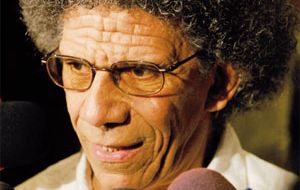MercoPress. South Atlantic News Agency
Book on Chavez in prison, “I saw him cry”, triggers controversy
 Agustin Blanco Muñoz, PhD in Social Sciences from the Central University of Venezuela
Agustin Blanco Muñoz, PhD in Social Sciences from the Central University of Venezuela A Venezuelan historian and academic presented the book ‘I saw him cry’ in which he affirms that President Hugo Chavez was crying, fearful and pleading to be sent to Cuba on April 11, 2002 during the coup that had him out of office for several days. He also insists there was no plan to have Chavez shot by a firing squad as the ‘official version” of events has since turned into epic days.
Agustin Blanco Muñoz, PhD in Social Sciences from the Central University of Venezuela said the book is based on testimonies from retired Army Captain Otto Gebauer who by random was sent by the rebellious Army high command to custody Chavez while retained.
“Gebauer was sent to custody the man that had resigned to his post as president of Venezuela. At that moment he went to the room where Chavez was being held and found him crying. When he asks Chavez why the tears, the then former president said because he wasn’t allowed to leave for Cuba”, said Blanco Muñoz.
The Venezuelan leader had repeatedly denied the version of the former Venezuelan Army intelligence Captain who was in charge of looking after him April 11/13.
“I never collapsed morally or spiritually during the days I was imprisoned”, Chavez stated before the official commission that investigated events of April 2002.
However, former Captain Otto Gebauer said that Chavez while in captivity was “run down and at one moment was crying” because he was “pleading in tears to be sent to Cuba”
“Gebauer was accused of inciting to sedition and of kidnapping the president of the republic”, said Blanco Muñoz. He has been in jail now for five years and seven months out of a total sentence of 12 years and a half.
The book also flatly denies the statement by Fidel Castro who in an interview said that Chavez was going to be sent before a firing squad by the rebellious officers. “This in only part of the myth fabricated since then”. He added there was “no firing squad or the insinuation of having him shot”.
“Chavez needed somebody guilty for his personal tragedy and Gebauer has been stigmatized as such” insists the historian.
Gebauer also tells that during those days of great uncertainty and with Chavez out of power, several lawmakers from Chavez ruling party offered opposition leader Pedro Carmona to take office as new president taking the oath before Congress. “This is a version that can’t be discarded”, says Blanco Muñoz. However it is still unclear who named Carmona president, “apparently the same generals that later reinstated Chavez; something is missing in the puzzle”.
Historian Blanco Muñoz points out that one of the alternatives regarding events of April 2002 is that originally it was “a self mounted coup” by Chavez who was facing a very difficult and strenuous internal situation. “Many times things don’t necessarily work out as originally planned”, he added.
During the presentation of the book this week in Miami, the wife of the imprisoned officer, Ana Mercedes Gebauer read a letter from her husband addressed to the Venezuelan exiles, where among other things he underlines that “from prison and exile the future of Venezuela is being built”.
Blanco Muñoz is currently coordinator of a research program: ‘Revolution, democracy and Socialism in current Venezuela, 1958/2008’. He has also written extensively among which 27 volumes dedicated to violence in Venezuela: 17 dedicated to Testimonies of Violence and 10 to “Violence in recent Venezuela: 1958/1980’.




Top Comments
Disclaimer & comment rulesCommenting for this story is now closed.
If you have a Facebook account, become a fan and comment on our Facebook Page!